Related Research Articles
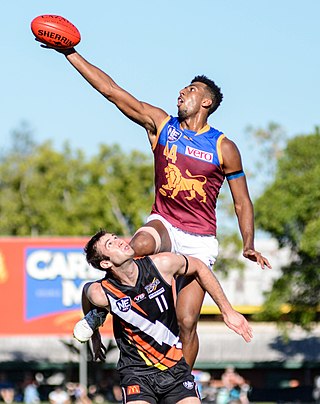
Australian rules football, also called Australian football or Aussie rules, or more simply football or footy, is a contact sport played between two teams of 18 players on an oval field, often a modified cricket ground. The game features frequent physical contests, spectacular marking, fast movement of both players and the ball, and high scoring.

Interchange is a team position in Australian rules football, consisting of players who are part of the selected team but are not currently on the field of play.

The laws of Australian rules football were first defined by the Melbourne Football Club in 1859 and have been amended over the years as Australian rules football evolved into its modern form. The Australian Football Council (AFC), was formed in 1905 and became responsible for the laws, although individual leagues retained a wide discretion to vary them. Following the restructure of the Victorian Football League's competition as a national competition and the League's renaming to be the Australian Football League (AFL), since 1994, the rules for the game have been maintained by the AFL through its Commission and its Competition Committee.
In the Australian Football League (AFL), previously the Victorian Football League (VFL), the pre-season competition, known during its history by a variety of sponsored names and most recently as the NAB Cup, was an annual Australian rules football tournament held amongst clubs prior to the premiership season between 1988 and 2013. The pre-season competition culminated annually in a grand final and pre-season premier.
In the sport of Australian rules football, the 50-metre penalty is applied by umpires to a number of different infractions when a free kick or mark has already been paid.

A free kick in Australian rules football is a penalty awarded by a field umpire to a player who has been infringed by an opponent or is the nearest player to a player from the opposite team who has broken a rule.
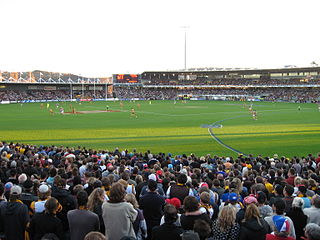
The AFL siren controversy, informally known as Sirengate, was the controversial conclusion and result of an Australian rules football match played on 30 April 2006 during round 5 of the Australian Football League's 2006 season. The match was played between the St Kilda and Fremantle Football Clubs at Aurora Stadium in Launceston, Tasmania.

The 1997 AFL Grand Final was an Australian rules football game contested between the Adelaide Football Club and the St Kilda Football Club, held at the Melbourne Cricket Ground in Melbourne on 27 September 1997. It was the 101st annual grand final of the Australian Football League, staged to determine the premiers for the 1997 AFL season. The match, attended by 99,645 spectators, was won by Adelaide by a margin of 31 points, marking that club's first premiership victory.

The 1992 AFL Grand Final was an Australian rules football game contested between the West Coast Eagles and the Geelong Football Club, held at the Melbourne Cricket Ground in Melbourne on 26 September 1992. It was the 96th annual grand final of the Australian Football League, staged to determine the premiers for the 1992 AFL season. The match, attended by 95,007 spectators, was won by West Coast by a margin of 28 points, marking that club's first premiership victory and the first by a team based outside the state of Victoria.
The 2003 Wizard Home Loans Cup was the Australian Football League competition played in its entirety before the Australian Football League's 2003 Premiership Season began. The AFL National Cup is also sometimes referred to as the pre-season cup because it is played in its entirety before the Premiership Season begins. The final was won by Adelaide for the first time in its history, defeating Collingwood by 31 points

This list is an alphabetical glossary of Australian rules football terms, jargon and slang. While some of these entries are shared with other sports, Australian rules football has developed a unique and rich terminology.
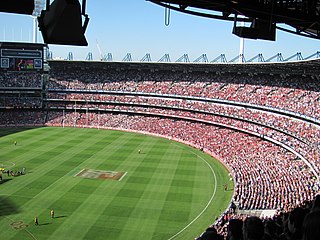
The 2011 AFL Grand Final was an Australian rules football game contested between the Collingwood Football Club and the Geelong Football Club, held at the Melbourne Cricket Ground on 1 October 2011. It was the 116th annual grand final of the Australian Football League, staged to determine the premiers for the 2011 AFL season. The match, attended by 99,537 spectators, was won by Geelong by a margin of 38 points, marking the club's ninth VFL/AFL premiership victory. Geelong's Jimmy Bartel was awarded the Norm Smith Medal as the best player on the ground.

The 2012 AFL Grand Final was an Australian rules football game contested between the Hawthorn Football Club and the Sydney Swans at the Melbourne Cricket Ground on 29 September 2012. It was the 117th annual grand final of the Australian Football League, staged to determine the premiers for the 2012 AFL season. The match, attended by 99,683 spectators, was won by Sydney by 10 points, marking the club's fifth VFL/AFL premiership victory. Sydney's Ryan O'Keefe was awarded the Norm Smith Medal as the best player on the ground.

The 2013 AFL Grand Final was an Australian rules football game contested between Hawthorn Football Club and Fremantle Football Club at the Melbourne Cricket Ground on 28 September 2013. It was the 118th annual grand final of the Australian Football League, staged to determine the premiers for the 2013 AFL season. The match, attended by 100,007 spectators, was won by Hawthorn by a margin of 15 points, marking the club's eleventh VFL/AFL premiership victory. Hawthorn's Brian Lake was awarded the Norm Smith Medal as the best player on the ground.
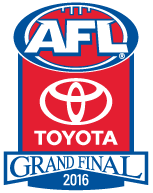
The 2016 AFL Grand Final was an Australian rules football game contested between Sydney and the Western Bulldogs at the Melbourne Cricket Ground on 1 October 2016. It was the 121st annual Grand Final of the Australian Football League, staged to determine the premiers of the 2016 AFL season. The match, attended by 99,981 spectators, was won by the Bulldogs by a margin of 22 points, marking the club's second VFL/AFL premiership victory and first since 1954. It was the first time in VFL/AFL history that a team won the premiership from seventh place on the ladder. Jason Johannisen of the Bulldogs was awarded the Norm Smith Medal as the best player on the ground.

The 2017 AFL Grand Final was an Australian rules football game contested between the Adelaide Football Club and the Richmond Football Club at the Melbourne Cricket Ground on 30 September 2017. It was the 122nd annual grand final of the Australian Football League staged to determine the premiers for the 2017 AFL season. The match, attended by 100,021 spectators, was won by Richmond by a margin of 48 points, marking the club's eleventh VFL/AFL premiership and first since 1980. Richmond's Dustin Martin was awarded the Norm Smith Medal as the best player on the ground.

The 2018 AFL Grand Final was an Australian rules football game contested between the West Coast Eagles and the Collingwood Football Club at the Melbourne Cricket Ground on 29 September 2018. It was the 123rd annual grand final of the Australian Football League, staged to determine the premiers for the 2018 AFL season. The match, attended by 100,022 spectators, was won by West Coast by a margin of five points, marking the club's fourth premiership and first since 2006. West Coast's Luke Shuey won the Norm Smith Medal as the player judged best on ground.
AFLX is a variation of Australian rules football designed in 2017 to be played on a soccer field. Unlike the full 18-a-side game, AFLX required fewer players with some modified rules aimed at generating higher scores, including increased scoring points. It was founded in an attempt to appeal to a wider audience outside of its origin country of Australia. The AFL billed AFLX as its answer to Twenty20 or Rugby Sevens.
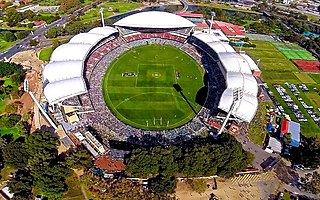
The 2022 AFL Women's season 6 Grand Final was an Australian rules football match held at the Adelaide Oval on 9 April to determine the premiers of the sixth season of the AFL Women's (AFLW) competition.

The 2022 AFL Women's season 7 Grand Final was an Australian football match held at the Brighton Homes Arena on 27 November 2022 to determine the premiers of the seventh season of the AFL Women's (AFLW) competition. The match was contested between the Brisbane Lions and the Melbourne Football Club. It was played in 30 °C (86 °F) heat. Melbourne emerged as winners by four points.
References
- 1 2 "2018 JLT Series: AFL axes nine-point SuperGoals after 15 years". Fox Sports. 20 February 2018. Retrieved 2 October 2023.
- ↑ St Kilda Football Club, 2011 NAB Cup Trial Rules Archived 2 October 2011 at the Wayback Machine , 15 December 2010, Retrieved 5 February 2011.
- ↑ "Punters not 'all clear' on correct cup scores". Herald Sun . 13 March 2007. Retrieved 15 March 2007.
- ↑ Nicole Brady (26 August 1993). "VFA may take a punt on nine-point goals". The Age. Melbourne, VIC. p. 26.